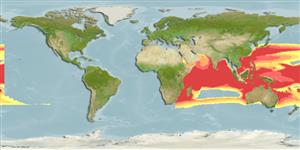Environment: milieu / climate zone / depth range / distribution range
Ecologie
marien; diepte 0 - 335 m (Ref. 30434). Tropical
Indo-West Pacific: Madagascar, Indonesia, the Philippines, and Australia (Ref. 30434). Recorded from Iskenderun Bay, Turkey probably entered the Mediterranean via ballast water (Ref. 85233).
Grootte / Gewicht / Leeftijd
Maturity: Lm ? range ? - ? cm
Max length : 12.7 cm TL mannelijk / geslacht onbekend; (Ref. 102960)
Dorsale stekels (totaal): 4 - 6; Dorsale zachte stralen (totaal): 18-23; Anale zachte stralen: 16 - 21. Chin naked. A row of 5 to 9 pairs of sensory papillae on dorsal surface of head from snout to interorbital. Sensory papillae between eyes not arranged in a semicircle. Ventral margin of pupil indented by tab of iris (Ref 12850).
Levenscyclus en paargedrag
Maturiteit | Voortplanting | Paaien | Eieren | Fecunditeit | Larven
Nemeth, D., 1994. Systematics and distribution of fishes of the family Champsodontidae (Teleostei: Perciformes), with descriptions of three new species. Copeia 1994(2):347-371. (Ref. 30434)
Status op de Rode Lijst van het IUCN (Ref. 130435)
Gevaar voor de mens
Harmless
Gebruik door de mens
Meer informatie
Lokale namenSynoniemenMetabolismePredatorenEcotoxicologieVoortplantingMaturiteitPaaienPaaiaggregatiesFecunditeitEierenOntwikkeling van de eieren
ReferentiesAquacultuurAquacultuurprofielKweeklijnenGeneticaElectrophoresesErfelijkheidZiektesVerwerkingNutrientsMassaconversie
Tools
Speciale rapporten
Download XML
Internetbronnen
Estimates based on models
Preferred temperature (Ref.
123201): 18.2 - 27.8, mean 24.6 °C (based on 626 cells).
Fylogenetische diversiteitsindex (Ref.
82804): PD
50 = 0.5002 [Uniqueness, from 0.5 = low to 2.0 = high].
Bayesian length-weight: a=0.00479 (0.00229 - 0.00999), b=3.13 (2.94 - 3.32), in cm total length, based on LWR estimates for this species & (Sub)family-body (Ref.
93245).
Trofisch niveau (Ref.
69278): 4.1 ±0.5 se; based on size and trophs of closest relatives
Fishing Vulnerability (Ref.
59153): Low vulnerability (10 of 100).
